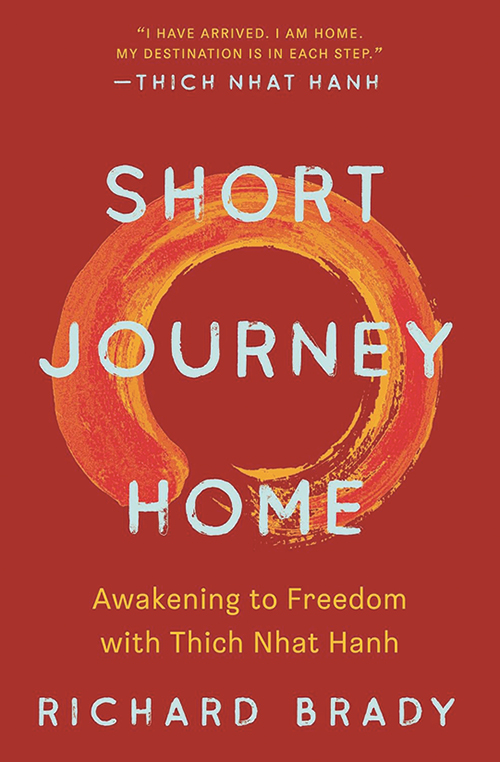
Short Journey Home: Awakening to Freedom with Thich Nhat Hanh
Reviewed by Harvey Gillman
August 1, 2025
By Richard Brady. Parallax Press, 2024. 208 pages. $17.95/paperback; $12.99/eBook.
I wrote this review of Richard Brady’s book at the same time I was preparing to interview Jennifer Kavanagh, a recent Friend in Residence at Pendle Hill study center in Wallingford, Pa., on her new book Thread of Life: My Russian Legacy. All three of us are of Jewish origin and are members of Quaker meetings. We have all been influenced by Buddhism, especially by the teachings of Thich Nhat Hanh. We are all discovering the connections between these three traditions. Through the lens of our life stories, we each ask: Who am I? What am I? Where am I going? Who is going with me? Where and what is home? These are also the basic questions posed by anyone who takes seriously the spiritual quest.
Brady is a seeker, teacher, communicator, storyteller, and a restless soul who seeks and often finds peace. Brought up in a non-practicing Jewish household, he was nonetheless taken “religiously” to a local Reform synagogue on Sundays with his brother. It was only years later that he discovered “the numinous aspect of religion” in Judaism.
At age 29, he became a mathematics teacher at Sidwell Friends School in Washington, D.C., where he learned about Quakerism and meeting for worship. He first learned about Buddhist meditation from a student of his, and soon after, he attended a Buddhist memorial service for a Buddhist Quaker friend of his wife. He was very much taken with Buddhist practice but then wondered if had the same “the transcendent dimension” he’d discovered in Quaker worship. It is this honest questioning and his ability to remain vulnerable that surely made Brady a good teacher and a good writer. He admits to his disappointments: after having enjoyed the questioning of his students at Sidwell, he attended a different Quaker meeting and found a certain complacency among the worshipers. He attended retreats in Plum Village (founded by Thich Nhat Hanh in France) and was overwhelmed, but coming down from the clouds back to daily life, he noticed how transitory the deep experience seemed.
The paradox of the book is that Brady understands that life itself is the teacher: that the here and now is the time and place to be, and that home is where you are. It is indeed a short journey, as the title implies, and yet he spends years traveling across continents and sits at the feet of so many teachers! How far does one have to travel from home to find home?
Brady understands that this awareness comes from years of discipline. We often need someone outside to point a finger at our hearts and souls. He talks of the three jewels transmitted by Thich Nhat Hanh: the Buddha nature, the Dharma, and the Sangha. These respectively refer to the journey into the self, as part of all things; the discipline of mindfulness; and the commitment to community. As I read this, I kept drawing parallels between the Buddhist way and Quaker faith and practice. I see in these jewels some basic Quaker convictions: the sacredness of the person and of life itself, the discipline of quiet waiting to attend to the sacred teacher, and the need for community as a place of discernment and support.
Although he does not use the word “ministry” itself, Brady conveys a sense of his ministry. He is given the spiritual name “True Dharma Bridge” in recognition of his ability to transmit the wisdom of the tradition, of the discipline, and of his own discoveries. After an initiation ceremony at Plum Village, he came to realize that at Sidwell he will no longer be teaching only mathematics: “I’ll be sharing, as best I can, empowerment, relationship, and love.” Increasingly in later years, he helps other teachers to explore the passing on of meditative techniques and mindfulness.
Included in an appendix at the end are the Fourteen Mindfulness Trainings that were created by Thich Nhat Hanh in 1966. These are meditations that members of Hanh’s Order of Interbeing vow to reflect on each day. The overlap between these and Britain Yearly Meeting’s “Advices and Queries” is remarkable, though the former are much longer than the latter. One noticeable difference is the tone, however. The Quaker text is tentative: full of exhortations to remember, to consider, and to question yourself; the Buddhist is full of resolutions: I am determined to, I am resolved, and we will practice. Perhaps that is a matter of culture, and the two ways may be able to sit comfortably together.
At one stage, Brady wonders whether he is a Jew, a Quaker, or a Buddhist. He answers that question when he writes: “In the historical dimension, we are separate beings who are born, grow older, and die. But in the ultimate dimension, we’re ever-changing formations in a single interconnected reality, we inter-are.”
There is a place beyond names and labels.
Harvey Gillman was outreach secretary for Britain Yearly Meeting for 18 years. He has traveled widely among Friends both at home and abroad, exploring the Quaker way and reflecting on issues of spirituality, outreach, inclusivity, and hospitality, both in his writings and in workshops and retreats.
1 thought on “Short Journey Home: Awakening to Freedom with Thich Nhat Hanh”
Leave a Reply
Comments on Friendsjournal.org may be used in the Forum of the print magazine and may be edited for length and clarity.




I appreciate this book review and the reflection on similarities and differences between Buddhism and Quakerism. Thank you!